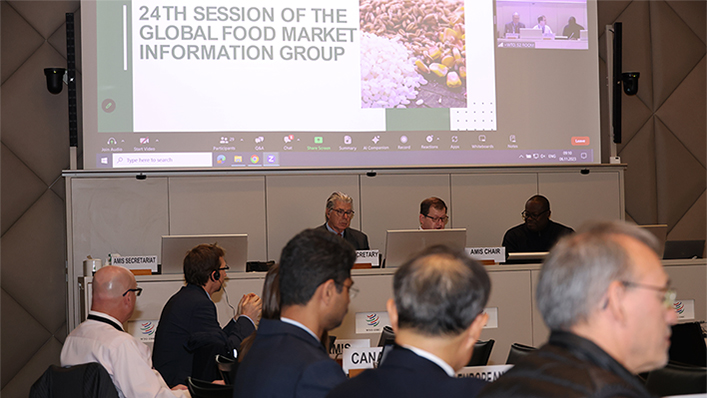
Edwini Kessie, Director of the WTO’s Agriculture and Commodities Division, opened the meeting by noting the crucial role that AMIS has played in enhancing transparency on global food markets and strengthening food security. “These are goals which WTO members wholeheartedly support,” he said.
“AMIS has helped to improve the functioning of global markets for food and agriculture by ensuring that accurate, timely information is publicly available on a regular basis,” Mr Kessie added. “This has been particularly important when these markets have been buffeted by sudden shocks, as has been the case in recent years.”
In the Ministerial Declaration on the Emergency Response to Food Insecurity adopted at the WTO’s 12th Ministerial Conference in June 2022, the first-ever WTO declaration on food security, trade ministers emphasised the importance of promptly sharing relevant information about policies that may affect trade and markets for food and agriculture. They also underlined the need to actively participate in relevant mechanisms for information exchange, explicitly acknowledging the “positive role” that AMIS plays.
AMIS is an inter-agency platform that seeks to enhance food market transparency and policy responses to food insecurity. Launched in 2011 by the Group of 20 agriculture ministers, AMIS brings together G20 members plus Spain and seven other major traders of agricultural commodities, who together represent 80-90% of global production, consumption and trade volumes of crops such as wheat, maize, rice and soybean.
Ten international organizations and agencies, including the WTO, are part of the AMIS Secretariat, which is hosted in the Rome headquarters of the UN Food and Agriculture Organization.
“AMIS is really about better decision making for individual countries,” said Seth Meyer, Chair of AMIS and Chief Economist with the U.S. Department of Agriculture. “Market transparency and trade are ways to moderate shocks in the market, so having information not only about your own markets, but markets around the world, helps better policy decision-making.”
Attended by representatives from governments, international organizations, academia and AMIS national focal points, the 6-7 November meeting provided participants with an opportunity to review the current food market situation and discuss topical issues affecting food markets today. It included an overview of global trends in commodities markets and examined the impact of El Niño conditions on the agriculture sector, as well as the impact of agricultural export restrictions on markets.
“We had a broad discussion about what is driving commodity markets, where do we see risks at a global level, and what do we think we need to pay attention to,” Mr Meyer said. “Coming together is important to try and talk about different aspects of the balance sheet and draw out some information from countries participants.”
Mr Kessie said the value of this work “has been clear in recent months, as governments have taken steps to lift or to ease the export restrictions that some imposed in the wake of the food price spikes in March 2022.” He highlighted the monthly AMIS Market Monitor, which provides a regular synopsis of major developments in international commodity markets.
“With around 9% of the world’s population still facing hunger, it’s vital we improve how global markets for food and agriculture function. And climate change is only going to intensify the challenge of doing so. It’s therefore no surprise that improving food security is a major focus of WTO negotiations on food and agriculture, in the run-up to our 13th ministerial conference in February 2024,” Mr Kessie added.
Joseph Glauber, Interim Secretary of AMIS and Senior Research Fellow with the International Food Policy Research Institute, said the improved information that AMIS provides has been useful to governments in adjusting to shifting market circumstances.
“The main thing is for them to make sure they know what they’re doing, making those decisions fully aware of what the market information is telling them,” he said.
More information about AMIS is available here.
Subscribe to “News Harvest”, the WTO’s monthly food and farm policy trade news round-up.
Share
Reach us to explore global export and import deals